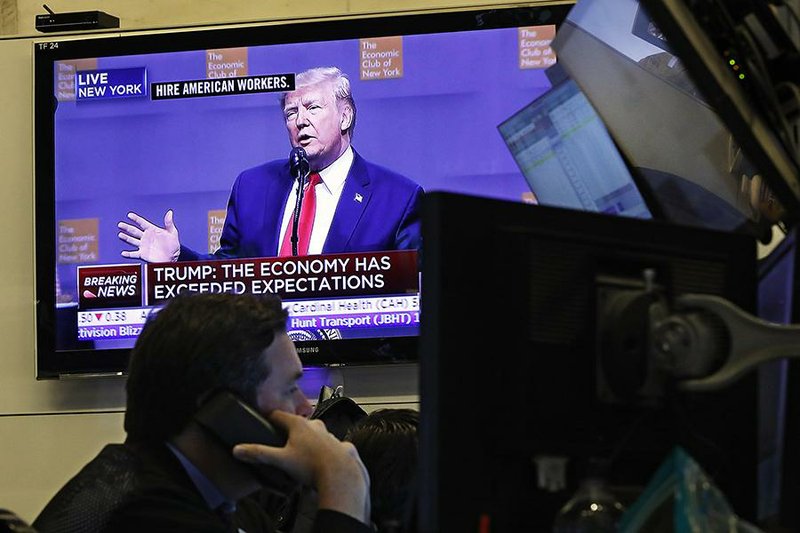WASHINGTON -- President Donald Trump on Tuesday said the United States was "close" to an interim deal with China and that an agreement "could happen soon," even as he renewed his threat of additional tariffs.
In a speech to the Economic Club of New York, Trump claimed credit for an economic "boom" while downplaying any negative effects on the U.S. economy from the tariffs that both sides have placed on each other's goods.
If China doesn't accede to America's trade terms, he said, "we're going to substantially raise those tariffs."
"We will only accept a deal if it's good for the United States," he added.
Washington and Beijing are trying to reach agreement on the initial phase of a deal that would resolve some of the administration's concerns about China's economic practices and help defuse tensions that have slowed the global economy.
But Trump's comments provided little clarity about whether the two sides were any closer to a deal. Since he announced Oct. 11 that the United States had reached a preliminary agreement with the Chinese, the administration has vacillated between optimistic and pessimistic statements.
In his remarks, the president defended his approach, accusing China of cheating the United States for years and unfairly targeting American farmers with its tariffs.
"I will not say the word 'cheated,' but nobody has cheated better than China," said Trump.
He denied that his trade policy had created uncertainty for the economy, adding that the real cost "would be if we did nothing."
In a speech that was heavy on politics, Trump credited a program of tax cuts, deregulation and tough trade policy for creating 7 million new jobs and for encouraging companies to set up shop in the United States. If Republicans took back the House and retained control of the Senate and the White House in 2020, America's prosperity would continue, the president said.
He predicted that the business crowd would vote for him in November 2020.
"The truth is, look, you have no choice, because the people we are running against are crazy," he said to laughter from the crowd. "OK? They are crazy."
Speaking to an audience in Manhattan that included son-in-law Jared Kushner and White House economic adviser Larry Kudlow, Trump said he had delivered on his promises to reverse what he described as a decline in U.S. industry.
"We have ended the war on American workers, we have stopped the assault on American industry, and we have launched an economic boom the likes of which we have never seen before," Trump said.
The United States' economic expansion is in its record-breaking 11th year, but growth in the most recent quarter slowed to an annualized 1.9% -- a far cry from the gains of "4%, 5% and even 6%" that Trump said his 2017 tax cuts would make possible. The president has not been able to boost the U.S. steel industry with tariffs, while coal has been supplanted as an energy source by natural gas.
Unemployment is near a five-decade low of 3.6%, a point of pride for Trump. The job gains defied the forecasts of many government economists who anticipated less hiring because of an aging population. Job growth has slowed somewhat recently, but that is in line with economists' expectations.
Manufacturing has slowed sharply this year, with factory activity contracting in August, September and October, according to data from the Institute for Supply Management.
Businesses have been slow to buy equipment despite Trump's corporate tax cuts, which provided favorable tax treatment for new purchases. Many businesses cite uncertainty related to the administration's drawn-out trade wars as a cause for their hesitancy. Productivity, which looked to trend upward, posted a decline in the third quarter, data showed last week.
In his speech Tuesday, Trump again criticized the Federal Reserve for not slashing a benchmark interest rate to nearly zero, a level that historically would signal an economy in crisis. The president has consistently called for lower rates, citing European nations with negative interest rates on their government debt and arguing that the Fed is putting the United States at a competitive disadvantage.
"Give me some of that money," he said. "I want some of that money."
Meanwhile, Trump's economic advisers are exploring whether the president should campaign for reelection with the proposal of a 15% tax rate for the American middle class, with some seeing the idea as a simple way of selling Republicans' economic agenda as not merely beneficial to the rich, according to multiple people involved in the White House's internal deliberations.
Kudlow is spearheading the effort behind Trump's second tax-cut package and is widely seen as a leading proponent of a 15% rate, the people say. It is unclear if Trump has approved the idea, but sources said the president has pushed aides to develop a simple tax message for 2020 that focuses on middle-class tax relief.
The White House has faced criticism for its 2017 law because its tax cuts for individuals and families will eventually expire in a few years while the reductions for businesses are permanent. A new plan is unlikely to clear Congress before the 2020 election but would give the White House a specific plan to present to voters during next year's presidential campaign.
Information for this article was contributed by Ana Swanson, Maggie Haberman and Jeanna Smialek of The New York Times, by Josh Boak and Zeke Miller of The Associated Press and by Jeff Stein of The Washington Post.
Business on 11/13/2019
